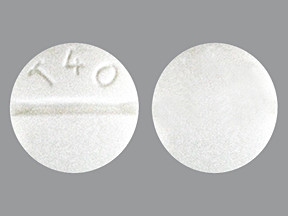THIOGUANINE - ORAL
PHONETIC PRONUNCIATION: (THYE-oh-GWA-neen)
COMMON BRAND NAME(S): Tabloid
GENERIC NAME(S): thioguanine
Uses
USES: Thioguanine is used along with other drugs to treat a certain type of cancer (acute myeloid leukemia-AML). It is a chemotherapy drug that works by slowing or stopping the growth of cancer cells.
How to use THIOGUANINE - ORAL
HOW TO USE: Take this medication by mouth with or without food as directed by your doctor, usually once daily. Drink plenty of fluids while taking this medication unless otherwise directed by your doctor. Doing so may help decrease the risk of certain side effects (kidney problems). The dosage is based on your medical condition, weight, and response to treatment. Do not increase your dose or use this drug more often or for longer than prescribed. Your condition will not improve any faster, and your risk of serious side effects will increase. Use this medication regularly to get the most benefit from it. To help you remember, take it at the same time each day. Since this drug can be absorbed through the skin and lungs and may harm an unborn baby, women who are pregnant or who may become pregnant should not handle this medication or breathe the dust from the tablets.
Side Effects
Precautions
Interactions
Overdose
Images
Reviews
Faq for THIOGUANINE - ORAL
Thioguanine is a medication that belongs to the class of drugs known as antimetabolites. It is used to treat certain types of cancer, including acute lymphoblastic leukemia (ALL).
Thioguanine works by interfering with the growth and spread of cancer cells in the body. It inhibits the synthesis of DNA and RNA, which are essential for the replication and division of cancer cells.
Common side effects of Thioguanine may include nausea, vomiting, loss of appetite, diarrhea, stomach pain, hair loss, skin rash, and changes in the color of the skin or nails. It may also cause a decrease in the production of blood cells, leading to an increased risk of infection, bleeding, or anemia.
Thioguanine is usually taken orally as a tablet. The dosing schedule and duration of treatment may vary depending on the type and stage of cancer being treated. It is important to follow the instructions provided by your healthcare provider and not to adjust the dosage without consulting them.
Yes, Thioguanine should not be used by individuals who are allergic to it or have had severe bone marrow suppression caused by previous chemotherapy. It is also contraindicated in pregnant or breastfeeding women.
Thioguanine may interact with certain medications, including allopurinol (used to treat gout), warfarin (a blood thinner), and certain immunosuppressive drugs. It is important to inform your healthcare provider about all the medications you are taking to avoid potential drug interactions.
Thioguanine has been found to be effective in treating acute lymphoblastic leukemia (ALL) and is often used in combination with other chemotherapy drugs. However, the effectiveness of the drug may vary depending on individual factors such as the type and stage of cancer, as well as the patient's overall health.
Thioguanine may have long-term side effects, including an increased risk of developing secondary cancers, such as myelodysplastic syndrome or acute myeloid leukemia. Regular monitoring and follow-up with your healthcare provider are important to detect and manage any potential long-term effects.
If you miss a dose of Thioguanine, take it as soon as you remember. However, if it is almost time for your next scheduled dose, skip the missed dose and continue with your regular dosing schedule. Do not double the dose to make up for the missed one.
Disclaimer
IMPORTANT: HOW TO USE THIS INFORMATION: This is a summary and does NOT have all possible information about this product. This information does not assure that this product is safe, effective, or appropriate for you. This information is not individual medical advice and does not substitute for the advice of your health care professional. Always ask your health care professional for complete information about this product and your specific health needs.

No Reviews Yet